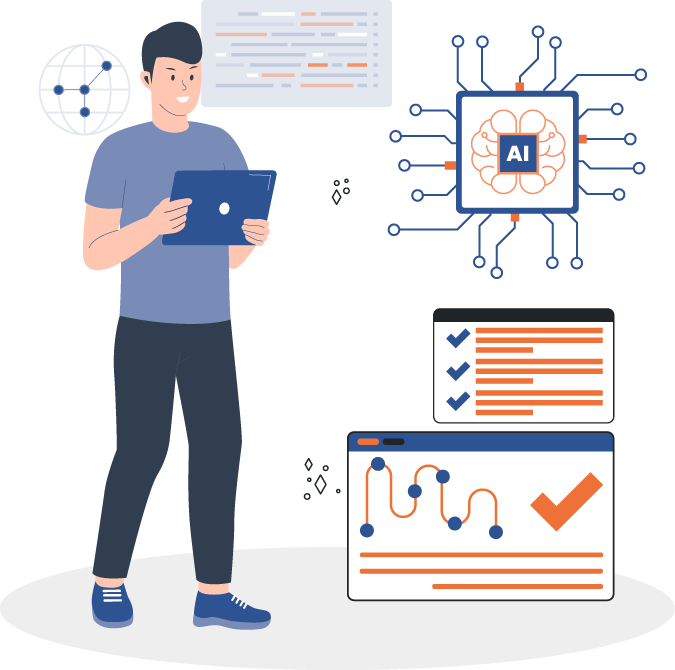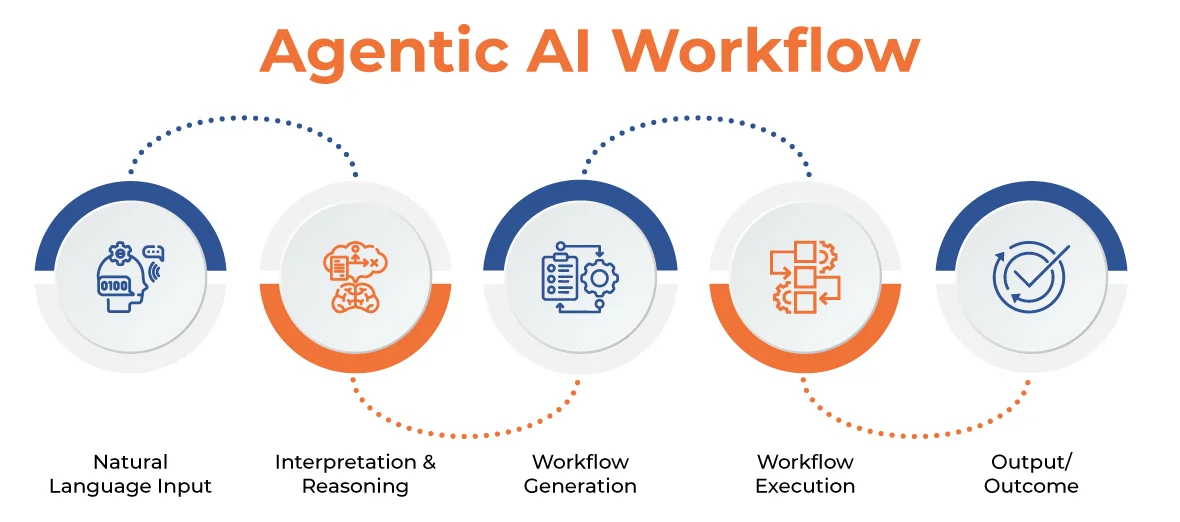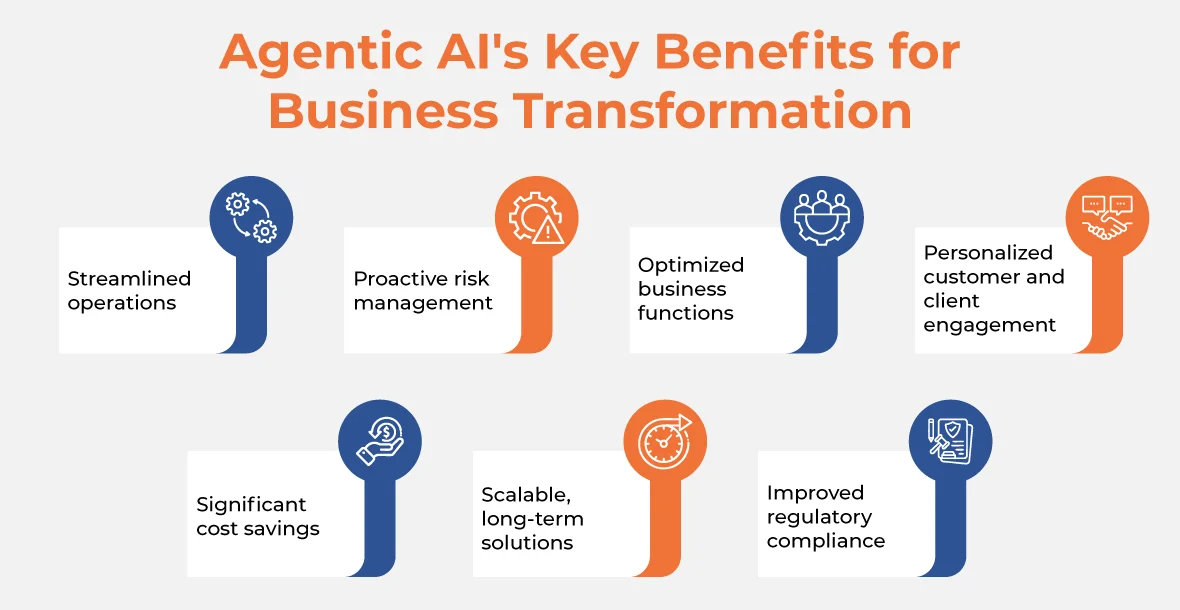Agentic AI
Agentic AI is a gateway to smarter decision-making, seamless automation, and transformative business outcomes.

What is Agentic AI?
Imagine an AI that doesn’t just respond to your commands, but proactively solves problems and pursues goals on your behalf. This is the reality of Agentic AI—a revolutionary advancement ranked among Gartner’s top strategic technology trends for 2025 and poised to transform how businesses operate.
Unlike conventional AI systems that merely process information, Agentic AI functions as an autonomous digital workforce, capable of:
- Analyzing your business environment
- Recognizing patterns traditionally thought to require human intelligence
- Asking insightful questions to draw meaningful conclusions
- Creating processes to streamline workflows
- Executing tasks to drive business efficiency and excellence


What is the difference between Agentic AI vs AI Agents?
The terms ‘AI Agents’ and ‘Agentic AI’ are increasingly common, but often used interchangeably, leading to confusion. While related, they represent distinct concepts with varying levels of autonomy and capability. To clarify the difference, think of AI Agents as specialized tools, and Agentic AI as a system that orchestrates those tools. The following table provides a clear comparison to help you understand their unique characteristics and potential business impact.
| Feature | AI Agents | Agentic AI |
| Definition | A specific program or software designed to perform a defined task. Think of it as a specialized worker. | A broader concept describing AI systems that can independently plan, reason, and execute complex tasks across various domains. Think of it as a self-managing team. |
| Scope | Narrow, focused on a single or limited set of tasks. | Broad, capable of handling diverse and complex problems. |
| Autonomy | Limited. Follows pre-programmed instructions. Requires human intervention for changes. | High. Can independently set goals, plan, and adapt to changing environments. |
| Reasoning & Planning | Minimal or none. Relies on predefined rules and algorithms. | Advanced. Uses reasoning and planning to break down complex tasks into smaller, manageable steps. |
| Learning & Adaptation | May learn within its specific task but limited to that scope. | Continuously learns and adapts to new information and situations, improving performance over time. |
| Example | A chatbot designed to answer customer service queries, a recommendation engine, a spam filter. | An AI system that can manage a supply chain, conduct scientific research, or automate complex business processes. |
| Complexity | Relatively simple to develop and deploy. | More complex, requiring advanced AI techniques and architectures. |
| Business Impact | Automates routine tasks, improves efficiency in specific areas. | Transforms entire workflows, enables strategic decision-making, drives innovation. | Analogy | A robotic arm that does one specific welding task. | A self-driving car that can plan routes, avoid obstacles, and adapt to traffic. | Focus | Task execution | Problem Solving |
Are you ready to explore the transformative power of Agentic AI?
Watch our on-demand webinar to learn how Nividous can help your business thrive in this new era.
How Agentic AI Works
Agentic AI represents a transformative leap in artificial intelligence, enabling autonomous, goal-directed behavior through the integration of multiple advanced technologies. Unlike traditional automation, which follows rigid, predefined rules, Agentic AI dynamically interprets objectives, devises strategies, and iteratively refines execution to navigate complexity and uncertainty independently.

Key Components of Agentic AI
Large Language Models (LLMs)
Modern LLMs, with hundreds of billions of parameters, serve as the “brain” of Agentic AI. These models enable contextual understanding, goal interpretation, and intelligent plan generation, allowing the system to reason and respond effectively in diverse scenarios.
Reinforcement Learning
Reinforcement learning (RL) empowers Agentic AI to improve continuously by learning from experience. Through trial and error, the system refines its decision-making processes based on feedback, much like how humans learn from successes and failures.
Planning Algorithms
Advanced planning algorithms break down high-level goals into executable steps. These algorithms optimize decision pathways by considering constraints, available resources, and real-time adjustments, ensuring efficient and adaptable execution.
Tool Integration
Agentic AI extends beyond reasoning to execution by integrating with APIs, databases, and business software such as Enterprise Resource Planning (ERP) systems, Customer Relationship Management (CRM) platforms, and robotic process automation (RPA) tools. This allows it to act on insights autonomously within business ecosystems.
Continuous Feedback Loop: How These Components Work Together
Rather than functioning in isolation or a linear sequence, these components operate within an iterative feedback loop. LLMs interpret goals and generate initial strategies, reinforcement learning refines execution based on outcomes, planning algorithms dynamically adjust steps, and tool integrations enable real-world implementation. This continuous interaction ensures adaptability, allowing Agentic AI to evolve and improve in real-time as new data and conditions emerge.
Example: Supply Chain Optimization
An Agentic AI system tasked with optimizing a company’s supply chain could:
- Analyze historical data and real-time market trends using predictive analytics.
- Identify potential bottlenecks or inefficiencies through anomaly detection.
- Develop & Execute a multi-step plan, such as re-routing shipments or adjusting supplier contracts.
- Integrate & Automate execution by interfacing with the company’s ERP system to adjust inventory levels in real-time.
- Monitor & Adapt by continuously learning from results and refining its approach.
Agentic AI: What Can It Do for You?

Agentic AI can revolutionize business efficiency and agility by automating complex tasks and driving innovation across departments. Here are some of the key benefits offered by Agentic AI for your organization:
1. Streamlined operations
Agentic AI can drive real-time coordination, minimizing fragmented communication and operational delays. The result is a stress-free flow of information and actions across departments.
Real-world impact: A manufacturing company reduced production planning cycles from 5 days to less than 24 hours by implementing Agentic AI to coordinate between sales forecasts, inventory management, and production scheduling.
2. Proactive risk management
Potential risks can be identified through proactive monitoring systems powered by Agentic AI solutions. This reduces disruptions and mitigates losses, boosting the resilience of your operations.
Real-world impact: Financial institutions are using Agentic AI to monitor thousands of transactions per second, identifying suspicious patterns and potential compliance issues before they trigger regulatory concerns.
3. Optimized business functions
Agentic AI can improve key business functions such as inventory management, documentation, and scheduling. The key benefit here is error-free processes and workflows, introducing a new level of agility and competitiveness in how your business operates.
Real-world impact: Retailers implementing Agentic AI for inventory management have reduced stockouts by up to 30% while simultaneously decreasing excess inventory by 25%.
4. Personalized customer and client engagement
Agentic AI leverages large datasets to personalize interactions on a large scale. From responding to customer queries to managing clients in complex business environments, Agentic AI provides targeted individual care with minimal human intervention.
Real-world impact: Healthcare providers using Agentic AI for patient engagement have seen a 40% increase in appointment adherence and a 35% improvement in treatment plan compliance.
5. Significant cost savings
Quickly delivered actionable insights are a trademark of Agentic AI solutions. This will help you respond quickly to changes in customer preferences, market dynamics, and operational needs.
Real-world impact: Energy companies have reduced maintenance costs by up to 30% using Agentic AI to predict equipment failures and optimize maintenance schedules.
6. Scalable, long-term solutions
As your business grows, Agentic AI agents can quickly scale and adapt to higher demand without the need for additional resources.
Real-world impact: E-commerce companies have managed seasonal demand spikes of 400%+ without service disruptions by implementing Agentic AI for customer service and order management.
7. Improved regulatory compliance
Agentic AI solutions can manage and track compliance requirements in real-time, providing actionable insights that help your business stay up to date with industry regulations without manual intervention.
Real-world impact: Financial services firms have reduced compliance-related penalties by over 60% after implementing Agentic AI systems to monitor and ensure adherence to evolving regulations.
Agentic AI: What Possibilities Does It Unlock for Your Industry?
| Industry | Summary of functions | Impact Areas |
| Healthcare |
|
|
| Manufacturing and Supply Chain |
|
|
| Retail and E-Commerce |
|
|
| Legal and Compliance |
|
|
| Financial Services and Banking |
|
|
Decoding Automation: RPA vs. Traditional AI vs. Generative AI vs. Agentic AI
Robotic Process Automation (RPA)
This is the foundation. RPA excels at automating simple, repetitive tasks that follow clear rules. Imagine a software robot that can automatically input data, move files, or fill out forms. It’s like having a digital assistant that handles tedious, manual work, freeing up humans for more complex activities.
Traditional AI
This level adds intelligence to automation. Traditional AI can analyze data, learn patterns, and make decisions within a defined scope. Think of spam filters, chatbots, or recommendation systems. These AI applications use algorithms to process information and provide useful outputs, but they typically operate within pre-defined boundaries and require human oversight.
Generative AI
Generative AI focuses on creating new content, moving beyond simple automation or analysis. It leverages powerful models to generate text, images, code, and even music. Think of it as a creative partner that can produce original content based on your prompts. From drafting marketing copy to designing product visuals, Generative AI can assist in tasks that require creativity and innovation. While it can produce impressive results, it often needs human input to refine and ensure the output aligns with specific needs and contexts.
Agentic AI
Agentic AI goes beyond following rules or responding to commands. It can understand goals, perceive its environment, and take independent actions to achieve objectives. Imagine an AI agent that can proactively manage your schedule, negotiate deals on your behalf, or even run entire business processes with minimal human intervention.
| Feature | Robotic Process Automation (RPA) | Traditional AI | Generative AI | Agentic AI |
| Primary Function | Automates repetitive, rule-based tasks. | Analyzes data and makes predictions or classifications. | Creates new content (text, images, code, etc.). | Independently plans and executes complex tasks. |
| Task Type | Structured, predictable tasks (data entry, form filling). | Pattern recognition, data analysis, decision support. | Content creation, design, idea generation. | Complex problem-solving, strategic decision-making. |
| Autonomy Level | Very low. Follows pre-defined scripts. | Moderate. Requires training data and defined parameters. | Moderate. Can generate content but needs human guidance. | High. Can set goals, plan, and adapt independently. |
| Learning Ability | Limited. Follows fixed rules. | Learns from data, but within specific parameters. | Learns from data and can generate novel outputs. | Continuously learns and adapts to new situations. |
| Output | Automated actions, data transfer. | Predictions, classifications, insights. | New content (text, images, code). | Solutions, plans, executed tasks. |
| Example Business Use | Automating invoice processing, generating reports. | Fraud detection, customer segmentation, predictive maintenance. | Creating marketing content, designing product prototypes. | Managing supply chains, conducting research, automating complex workflows. |
| Key Technology | Software robots, workflow automation. | Machine learning algorithms, statistical models. | Large language models (LLMs), deep learning. | LLMs, reinforcement learning, planning algorithms. |
| Focus | Task automation | Data analysis and prediction | Content Creation | Autonomous problem solving |
| Human Interaction | Minimal after setup. | Requires data and parameter tuning. | Requires prompts and occasional review. | Requires high level goal setting, and oversight. |
Key Considerations for Successful Agentic AI Adoption
- Strategic Alignment & Control:
- Establish clear, measurable goals and objectives for Agentic AI initiatives.
- Develop robust control mechanisms to ensure AI decisions align with business strategy and ethical standards.
- Implement continuous monitoring and feedback loops to adapt and refine AI behavior.
- Seamless Integration & Implementation:
- Conduct thorough process assessments to identify optimal integration points.
- Develop a detailed implementation roadmap with clear milestones.
- Invest in robust infrastructure to support scalability and performance.
- Prioritize change management to smoothly transition workflows.
- Ethical Framework & Transparency:
- Establish clear ethical guidelines for AI development and deployment.
- Prioritize transparency and explainability in AI decision-making.
- Ensure accountability and responsibility for AI actions.
- Build trust with stakeholders through open communication.
- Data Security & Privacy:
- Implement strong data encryption and access controls.
- Ensure compliance with all relevant data privacy regulations.
- Conduct regular security audits and vulnerability assessments.
- Treat data security as a core business value.
- Talent Development & Continuous Learning:
- Invest in training and development programs to build AI expertise.
- Foster a culture of continuous learning and adaptation.
- Attract and retain top AI talent.
- Empower teams to leverage AI effectively.
What are the Risks and Challenges associated with adopting Agentic AI?
While the potential of Agentic AI is transformative, responsible implementation requires addressing several key challenges proactively. By anticipating and mitigating these risks before deployment, organizations can ensure AI-driven innovation is aligned with business objectives and societal expectations.
Control and Alignment
Challenge: Ensuring autonomous systems consistently make decisions aligned with business objectives and values.
Solution: Establish proactive governance models with AI guardrails that anticipate potential misalignments before deployment. Implement robust oversight mechanisms, clear operational boundaries, and continuous monitoring systems that provide appropriate human supervision without sacrificing AI efficiency.
Integration Complexity
Challenge: Seamlessly incorporating Agentic AI into existing business processes and technology ecosystems.
Solution: Adopt phased implementation approaches, prioritize process assessment and redesign, and invest in integration platforms that facilitate smooth connections between Agentic AI and legacy systems. Ensure API compatibility, data format standardization, and cross-platform integration tools to bridge gaps between legacy systems and AI-driven workflows.
Ethical Considerations
Challenge: Navigating complex ethical questions around AI autonomy, decision transparency, and potential biases.
Solution: Develop comprehensive ethical frameworks, prioritize explainable AI approaches, implement bias detection and mitigation strategies, and establish clear accountability for AI outcomes. Organizations should align AI governance with international regulatory frameworks such as GDPR and AI Act guidelines to ensure compliance and transparency. As Agentic AI regulation continues to evolve globally, organizations must establish monitoring systems to track emerging requirements and maintain flexible governance frameworks that can quickly adapt to new compliance demands.
Data Security
Challenge: Protecting sensitive business and customer data while enabling AI systems to access the information they need.
Solution: Implement data minimization principles, robust encryption, granular access controls, and continuous security monitoring specifically designed for AI systems. Adopting zero-trust security models and AI-specific cybersecurity protocols ensures data integrity and mitigates potential breaches.
Talent and Change Management
Challenge: Building internal capabilities to effectively develop, manage, and work alongside Agentic AI.
Solution: Invest in comprehensive training programs, strategic hiring initiatives for key AI roles, and change management approaches that address both technical skills and cultural adaptation. In addition to upskilling employees, fostering a culture of AI literacy and acceptance through leadership advocacy and pilot programs can ease the transition.
Competitive Advantage Through Risk Mitigation
Risk priorities will vary significantly across sectors—healthcare organizations may prioritize patient safety and HIPAA compliance, financial institutions will focus on model transparency and financial regulations, while manufacturing may emphasize operational safety and supply chain resilience. Organizations that proactively address these challenges will not only minimize risks and disruptions but also gain a strategic advantage by ensuring AI is leveraged responsibly, ethically, and efficiently. By embedding AI risk management into business strategy, companies can pave the way for long-term AI-driven innovation and sustainable growth.
The Future of Agentic AI: A Quick Look Ahead
Agentic AI promises to reshape our world by empowering intelligent, proactive systems. Expect significant gains in productivity through complex automation, personalized experiences driven by AI understanding individual needs, and accelerated innovation in solving global challenges. Businesses will adapt with new, AI-driven strategies, while ethical considerations become paramount. Ultimately, Agentic AI will augment human capabilities, fostering a future of collaborative intelligence and transformative progress.
Ready to See Agentic AI in Action?
Watch our expert-led webinar to discover how Agentic AI is revolutionizing business operations with real-world use cases across industries.
Nividous and Agentic AI
At Nividous, we’re not just observing the rise of Agentic AI—we’re actively shaping its future. As a leading provider of intelligent automation solutions, we understand that true transformation lies in proactive, self-managing systems that deliver measurable business impact.
Our Agentic AI Advantage
Nividous is strategically integrating Agentic AI capabilities into our comprehensive intelligent automation platform, which already combines:
- Robotic Process Automation (RPA) for task automation
- Native AI and ML capabilities for intelligent decision-making
- Generative AI for content creation and knowledge work
- Low-code process automation for rapid deployment and flexibility
This integration creates a unified ecosystem where Agentic AI can leverage all these capabilities to deliver unprecedented business value. By harnessing this synergy, businesses can move beyond traditional automation to fully autonomous, goal-driven processes.
Your Path to Agentic Excellence
Partner with Nividous to:
- Assess your organization’s Agentic AI readiness and opportunities with a structured evaluation framework.
- Design customized Agentic AI solutions tailored to your specific business challenges, ensuring alignment with strategic objectives.
- Implement scalable, secure Agentic AI capabilities seamlessly integrated with your existing systems and workflows.
- Optimize performance through continuous monitoring, adaptive learning, and iterative improvements to maximize ROI.
Take the Next Step
The future of business automation is here, and it’s agentic. Organizations that embrace this shift early will gain a significant competitive edge in efficiency, agility, and innovation.
What's Inside
Contact Nividous for an Agentic AI Consultation
Request a personalized demo of our Agentic AI platform.